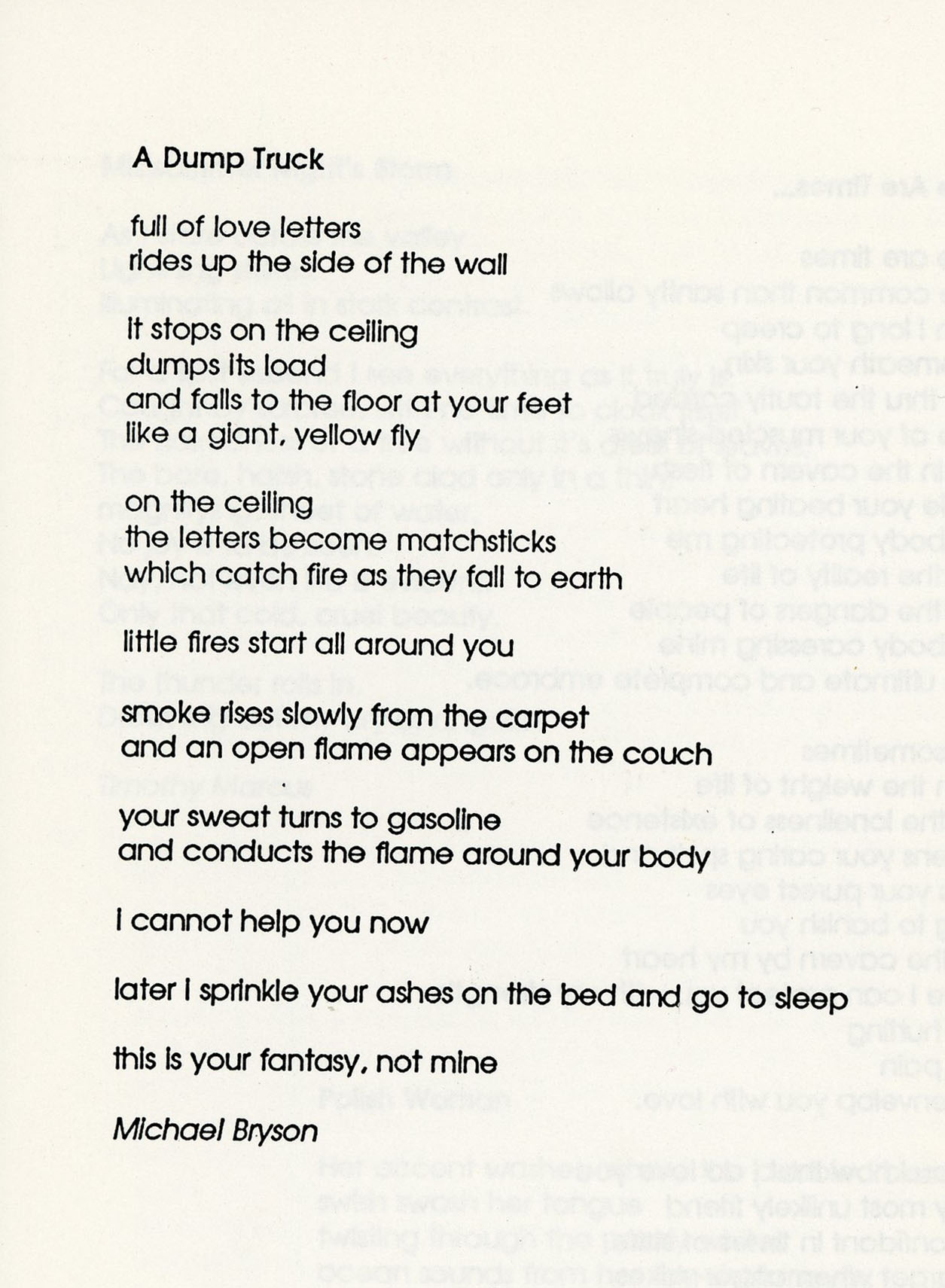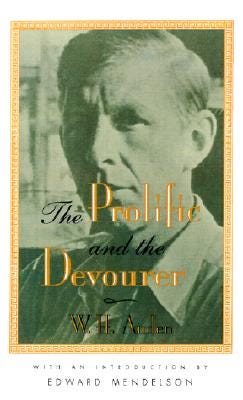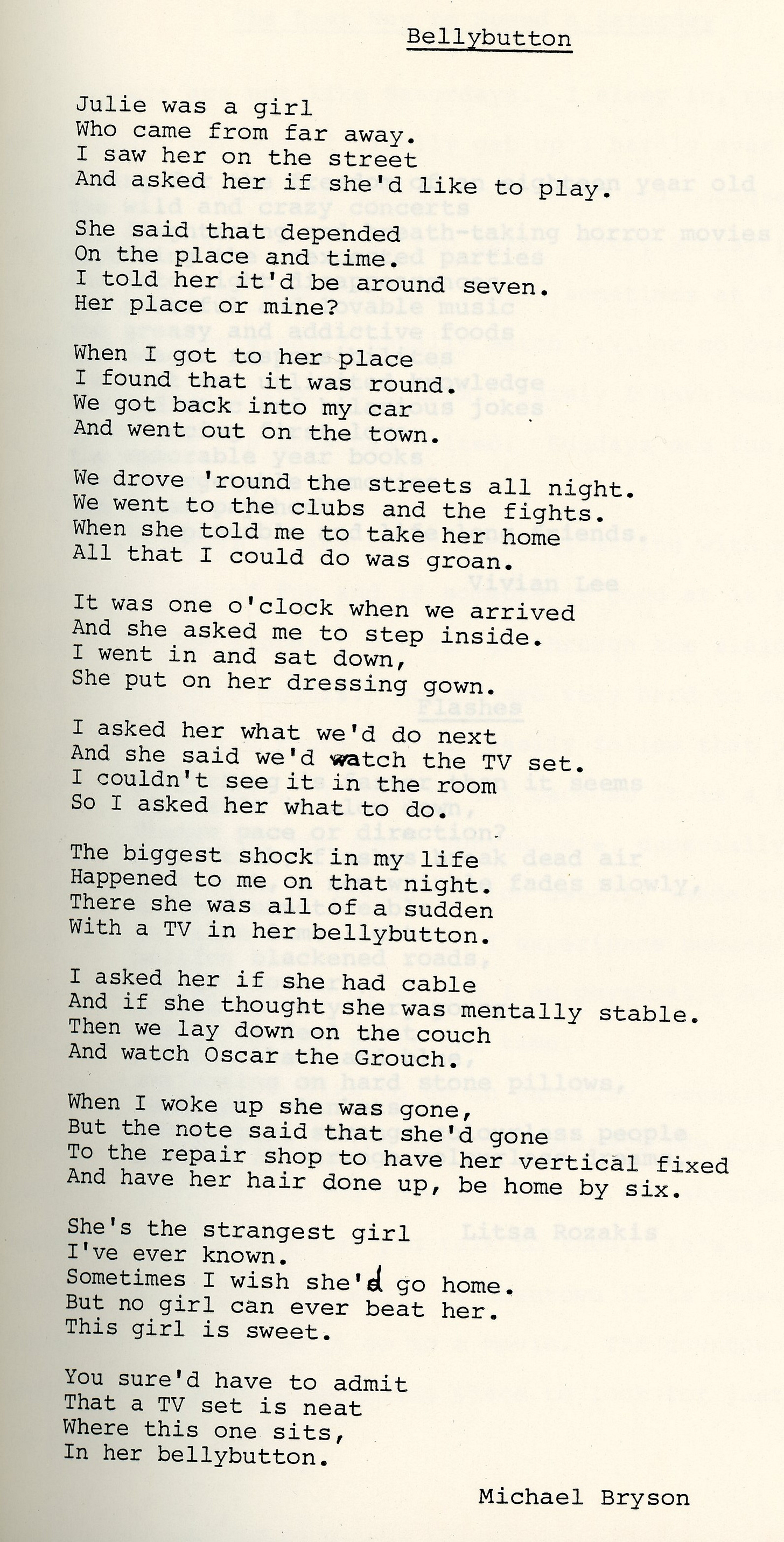I have been poking away at this entry for what seems like months now.
I started off with an account of seeing Al Purdy in Toronto, 1998 (more below), but then decided I didn't want to start there. No, I would start with the story of how I found W.H. Auden's The Prolific and the Devourer (1976) at the Bloor-Bay Chapters-Indigo store, an odd find for such a place. Then I decided against that, too.
Ultimately, the only focus for my thoughts on poetry was a focus on ambivalence. "I used to care, but," as Dylan sang, "things have changed."
In high school, poetry completely baffled me. Somewhere I picked up the idea that it was all about verbal tricks and decoding symbols. If I had a sense of poetry as verbal pleasure, it had ended with Alligator Pie (1974) — or had transferred to the stimulation of rock lyrics. It wasn't until my university survey of English literature courses that I paid serious attention to poetry. Initially, it was to the Romantics.
From Keats, Shelley Wordsworth, I took what undergraduates take. "Spontaneous emotion recollected in tranquility." "Unacknowledged legislators." "The holiness of the hearts affections and the truth of the imagination." Those marks remain with me still.
I started to capture my own moments of spontaneous emotions, not necessarily reflected in tranquility, though. Notebooks started to fill up with jottings that sort of resembled poetics. Some even found life in student publications. The impulses were generally directionless and without consideration of known forms. Free verse, exclusively, sometimes sans capitalization. It felt like something was happening, but what?
In the midst of this, Barfly (1987) circulated in rep cinemas, and I "discovered" Bukowski, and it seemed whatever it was that I was trying to do, literature was supposed to capture, it was something like that. Writing that put down what it felt to be alive, as unfiltered as possible.
Not what I would say now, but that was me then.

What was happening in Canadian poetry at the time? I had no idea, and no idea how to access it. Some names circluated with enough frequency to leave an impression. Susan Musgrave had been the writer-in-residence at the University of Waterloo, just before my time. Greg Cook was the new WIR, and he pulled a group of student together, a reading circle and little scene. George Eliott Clark had been the editor of the UW student newspaper, Imprint, and his book Whylah Falls (1990) arrive at this time. I knew Purdy was out there, but hadn't read him. Ditto. Alden Nowlan. Dennis Lee? See Alligator Pie. Margaret Atwood? Well, of course.
Later, I would read Daniel Jones' The Brave Never Write Poetry (1985) and think this would have been formative for me in the late 1980s, if I'd known about it. It had the post-punk aura that pervaded. And the sadness that I kept coming back to in my spontaneous moments, too.
It wasn't until post-2000, though, that I paid more attention to the current dramas and trends of Canadian poetry. I even read enough to follow the 2009 debate between Christian Bök and Carmine Starnino and feel curious if not engaged. The us-and-them nature of the debate was dramatic, but was it enlightening? Did I care who won? I didn't want either to win. Wasn't the debate itself, the collision of ideas, the point? But surely there were better ways to do it. Plus, there were many other perspectives out there, other voices not captured in this tete-a-tete.
Debates like that one weren't connected to any work that I was doing or was likely to do. If anything, I felt aligned, or most at home, in what was left of the People Poetry tradition, which is what ultimately brings us to Purdy and Milton Acorn et al.
I remember Rick Salutin wrote a column in the Toronto Star (or maybe G&M?), where he quoted Acorn's "Knowing I Live in a Dark Age" (1960). This poem captured well my darkened early 1990s world view. “Wither is it gone, the glory and the dream?”
Yes, still a haunted Romantic.

Anyway, it is hard to believe it will be twenty-five years this fall since I almost saw Al Purdy (1918-2000) give a reading at the Imperial Library Pub, 54 Dundas Street East, Toronto, an event I believe was the poet's last public event in the city, perhaps his final public event ever. Was it November? Early December? It was 1998, for sure.
I just missed the reading, the performance, but I did manage to see him. I didn't miss the reading because I arrived so late that I couldn't get in, which was true for others. The audience was backed up down the stairs. No, I arrived so late that that the audience was already thinning out. The reading was over, but he was still there. So I saw him.
I don't have strong feelings or deep thoughts about Purdy or his work. I have written reviews of poetry books and interviewed poets, but I feel no sense of authority on poetry in general. On fiction, I'm prepared to dig in, but less and less over time, it seems. On poetry, I feel I have a competent awareness, and therefore a self-consciousness of the vastness of what I don't know. But also, maybe I know enough to know that I don't care that much.
I enjoy what I enjoy and I'm pleasantly curious about the rest. I'm aware of different schools of thought, different poetry camps, and I've never had any interest in taking sides. I used to dig the Auden line, "Poetry makes nothing happen." It was a useful corrective to my in-dug Romanticism and useful for framing the question: what next? The Prolific and the Devourer was a great find for this quest also. It is taken from a notebook Auden kept, as he attempted to unpack his shifting approach to his work, generally conflicting impulses towards socialism and Christianity.
But even thinking about Auden’s epic struggle, now, makes me shrug.
So?
I love Stuart Ross’s Hey, Crumbling Balcony! (2003) because it takes its poetics seriously, while also not taking the world too seriously. Maybe it takes me back to Alligator Pie, some, too. Or maybe it’s just because I see the silly and serious intimately connected.
I have learned a thing or two about contemporary Canadian poetry, too. Maybe even enough to understand this tweet.
https://twitter.com/PaulVermeersch/status/1643000000484368384
In any case, there's a statue of Purdy, now, in the park behind the Ontario legislature. Placed there in 2008, it bears the inscription, "Voice of the Land." Since 2010, it (yes, the statue) has had a Twitter account.
I wonder about that Voice of the Land thing now, though, especially in our current moment where cultural events in Toronto tend to begin with a land acknowledgement, and they are definitely not talking about Purdy and his attempts to find inspiration in Canada’s vast and diverse landscapes, I mean, treaty territories.
Things have changed. About time.
(Special call out to Terry T.M. Green, who edited the EYCI student writing anthology, Festival, 1985, that featured my poem below… Surely influenced by Lennon/McCartney’s “Norwegian Wood”!)






